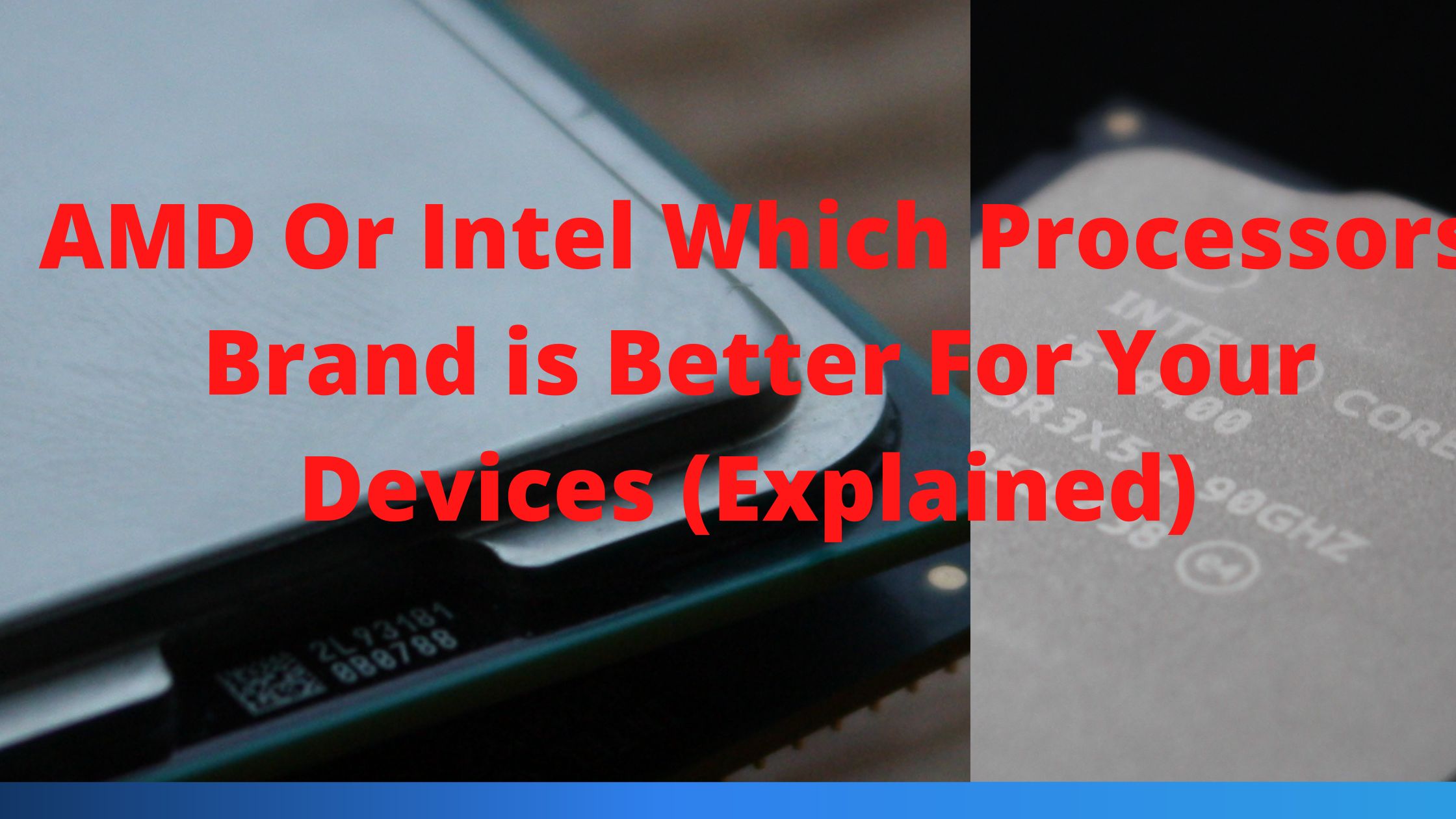Which Company’s Processors Are Better: AMD Or Intel? A phone, tablet, router, laptop, smart TV, or desktop PC all have central processing units (CPUs) at their core.
It is responsible for managing all of the operating system’s (OS) operations, ensuring that everything runs smoothly, and enabling amazing feats of computing. Like the OS dispute, the AMD vs. Intel argument has been a contentious one for years.
Should you choose AMD or Intel when buying a new laptop or parts to construct or upgrade your desktop PC? To get to a conclusion, I’ll lead you through a brief history lesson and examine pricing and performance data for several processors. This guide will assist you in choosing the best CPU manufacturer for your PC build.
AMD vs. Intel: A Brief History of the Chip makers
Both AMD and Intel have a long history in the computer industry. The x86 platform, created by the two businesses, continues to be utilized as the foundational architecture for creating processors.
However, AMD was the company that created 64-bit for their Athlon series of CPUs, leading to the designation AMD64 (later x86-64). Intel was reversing course.
After entering the 64-bit computing space on its own, Intel’s situation didn’t significantly improve, partly because AMD introduced the Athlon 64 X2 3800+, the first dual-core processor to ever be released.
However, AMD’s dominance in CPU innovation was coming to an end as Intel’s Core i5 and Core i7 CPUs started to innovate.
When new Intel mobile CPUs for laptops and desktops were released and far outpaced anything AMD could produce, the situation worsened.
AMD vs. Intel: Price & Value
This has long been the topic of intense debate and is likely the most significant decision factor between AMD and Intel.
Historically, AMD has been associated with more cores glued onto silicon than you’d know what to do with and CPUs that are more cost-effective but less energy-efficient.
Although older AMD CPUs like the FX series get hot, they have some useful applications.
Intel made an effort to keep prices comparable while simultaneously positioning its chips as simply superior, and up until recently, they were.
Intel effectively charged more than what they would typically charge for processors during AMD’s decline in the early decades of this century because AMD lacked a competitive product.
You had to pay Intel prices if you wanted performance from Intel.

Years of market share dominance by Intel were ultimately reversed by AMD with Ryzen and the Zen architecture.
AMD had reached a breaking point, therefore Ryzen’s introduction had to be a success. Fortunately for AMD supporters, this new platform represented a significant improvement over chips from earlier generations.
However, AMD aggressively priced the first-generation Ryzen family since it was the underdog and had to reclaim market share.
These brand-new AMD CPUs were just as good—if not slightly better—than the ones Intel was selling, and they were less expensive.
Because Intel was completely unprepared, the Core X series was hurried and the Core i9 X price cut by 50% was a disaster.
For PC builders and those wishing to upgrade their machine’s CPU as of right now, processor pricing is favorable.
Amd 6-core CPU with significant performance per core is available for less than $200. To provide better value in terms of cores and threads without making too many compromises in performance, AMD and Intel now regularly swap places.
Both the Ryzen 5 5600X and the Core i5-12600K from Intel are outstanding mid-range processors. The RRP for the former was $300 upon launch.
Costing $320 was the Intel Core i5-9600K. Both CPUs are currently available for about the same price, but they are not the same.
AMD’s Ryzen 5 5600X has 6 cores and 12 threads when it is unlocked. The Core i5-9600K from Intel is also unlocked but manages to fit 10 cores and 16 threads within.
AMD vs. Intel: Performance and Gaming
In terms of performance, Intel has consistently maintained a comfortable lead.
That isn’t the case anymore with AMD’s most recent Ryzen processors, while Intel has once again surpassed AMD with Alder Lake.
Consider the brand-new Intel Core i9-12900K. A strong 16-core CPU with 24 threads is used here. A new hybrid architecture based on Intel’s reduced manufacturing process design will increase its capabilities even further.
It has a Max Turbo speed of 5.2GHz, and 12th Gen Intel processors like this are what Intel enthusiasts have been yearning for years.
This beast is built for performance in normal computing, gaming, and even enthusiast use. Additionally, Intel advanced by introducing support for DDR5 RAM and PCIe 5.0.
However, AMD isn’t far behind. With a staggering 12 cores, 24 threads, and a boost clock speed of 4.8GHz, the AMD Ryzen 9 5900X is still regarded by many as the current sweet spot for gamers.
The Core i9-12900K and Ryzen 9 5900X are both excellent processors with affordable costs. The AMD Ryzen 9 5950X pleased us greatly during our review.
Regardless of which high-end processor you choose, both processor platforms provide more than enough performance for everyday tasks and gaming, so you won’t likely experience any bottlenecking.
Nevertheless, after accounting for everything, Intel prevails. Adversarial pricing is the effect of AMD’s pressure on Intel to restart innovation. PC owners benefit from this situation.
Which CPU is better between Intel and AMD?
It’s tough to choose the wrong CPU unless you try to put it on a motherboard that isn’t compatible.
Whether you choose AMD or Intel, your PC will be capable and able to perform a huge variety of jobs. However, there are definite price and value discrepancies.
The Ryzen 5000 in particular, from AMD, delivers excellent value for the money. Regardless of whether you install a Ryzen 3 5100 or Ryzen 9 5950X, you’ll probably get more cores and threads than the rival Intel CPU without making too many compromises in terms of per-core performance.
However, Intel’s new hybrid core design currently delivers fantastic value, and we’re huge fans of the Core i5-12600K and Core i9-12900K designs.
Final thought
Upgrade to a higher processor could yield significant results if you’re already committed to a platform and don’t intend to change motherboards.
Just keep in mind that AMD has much greater support for newer CPUs on older motherboards than Intel does, which only supports a chipset for two generations.
Performance-wise, Intel has a little advantage over AMD, but you won’t often see much of a difference in most real-world situations.
As AMD Ryzen 5000 and Intel 13th Gen continue to engage in combat, we’ll need to keep an eye on the situation.
Related Article:

